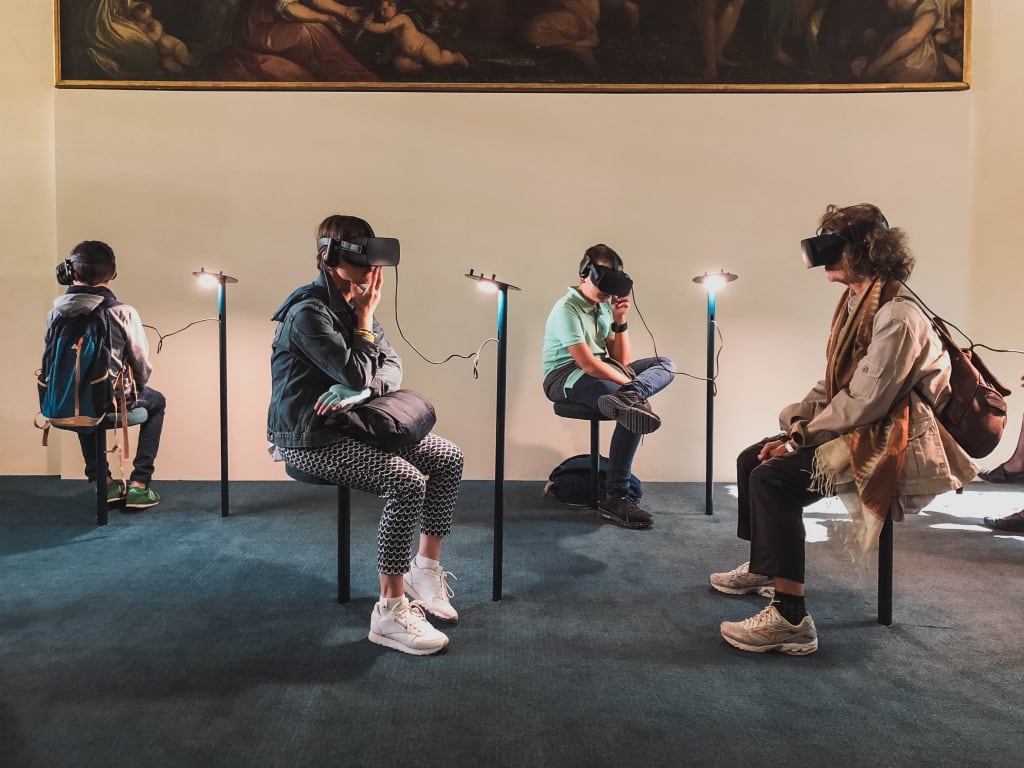What Is the Metaverse and How Will It Impact Our Future?
Here are my views on the Metaverse.

Metaverse, a concept that has been gaining traction in recent years, is a topic that has been widely discussed in social media. It looks appealing to me, but I am also concerned.
In this post, I will delve deeper into the concept by exploring it from multiple perspectives and providing an overview of the metaverse and its potential implications.
What is the Metaverse?
The metaverse is a term that describes a virtual reality space where people can interact with each other and digital objects in a shared environment.
It is often described as a kind of virtual world where users can engage in activities such as socializing, gaming, shopping, and entertainment.
The metaverse is imagined as a kind of successor to the internet, a fully immersive and interactive digital space where users can interact with each other and digital objects in real-time.
The concept of the metaverse is still mainly in development. However, it has been proposed as a potential future platform for various applications, including gaming, education, and social networking.
The technologies that will enable the metaverse to exist include virtual reality (VR), augmented reality (AR), and artificial intelligence (AI), which will be used to create realistic, interactive digital environments and experiences.
Who’s making a Metaverse?
Many companies and organizations are currently working on the development of a metaverse. Some notable examples include; Facebook (Meta), Roblox, Epic Games, Decentraland, Unity Technologies, and High Fidelity.
These are just a few examples of the many companies and organizations that are working on the development of a metaverse. It is an exciting and rapidly evolving field, and many more players will likely enter the space in the coming years.
Although the one company most people have likely heard of is Facebook with their metaverse, being created with Oculus VR headsets.
What are the pros and cons of life in the Metaverse?
There are many potential benefits and side effects of the metaverse, as I summarised in the below sections.
Increased connection and collaboration
One of the potential benefits of the metaverse is that it could provide a way for people to connect and collaborate with each other regardless of their physical location. The metaverse could create a shared digital space where people from all over the world can interact with each other in real-time.
In the metaverse, users could meet and socialize with people from different cultures and backgrounds, opening new opportunities for personal and professional connections.
The metaverse could also facilitate collaboration on projects and initiatives, allowing people to work together in a shared digital space regardless of their physical location.
Virtual reality technology, which would be a vital component of the metaverse, could enable new forms of interaction and collaboration, such as the ability to share and manipulate digital objects or to move and interact with virtual environments more naturally.
Additionally, the metaverse could also enable new forms of remote work, education, and events. For example, remote workers could attend virtual meetings, and virtual classrooms could be created for remote education. Events such as conferences and festivals could also be held in the metaverse, allowing people from all over the world to attend without traveling.
Increased accessibility
The metaverse could also provide increased accessibility for people with disabilities or mobility issues. By providing a virtual environment, the metaverse could enable people with disabilities or mobility issues to participate in activities that would otherwise be difficult or impossible in the physical world.
For example, people with mobility impairments could use virtual reality technology to move and interact with virtual environments more naturally, allowing them to participate in activities such as sports, dance, or exploration that may be difficult or impossible in the physical world.
The metaverse could also provide increased accessibility for people with visual or hearing impairments. For example, virtual environments could be designed to be more accessible for people with visual impairments, such as providing audio descriptions or increasing the size of text and interface elements.
Additionally, the metaverse could also help people with mental health conditions to connect with others, overcome social isolation and engage in activities that they might not have the energy or ability to do in the real world.
Increased creativity and innovation
The metaverse has the potential to significantly increase creativity and innovation. With the ability to create and explore new worlds and experiences, individuals and businesses can think outside the constraints of the physical world and come up with new and unique ideas.
Additionally, the metaverse allows for greater collaboration and communication, making it easier for people from all over the world to work together on creative projects.
However, there are also potential downsides to a future in the metaverse, including:
Privacy concerns
There are several privacy concerns associated with the metaverse. One concern is the collection and use of personal data by metaverse providers, as well as the potential for data breaches and hacking.
Additionally, the anonymity of the metaverse can make it challenging to regulate and monitor for illegal activities such as cyberbullying, hate speech, and harassment.
Another concern is the potential for companies to collect data on users’ virtual activities and use it for targeted advertising or other purposes.
This data collection can potentially include information about what users buy, who they interact with, and even their physical movements and expressions.
Moreover, the metaverse can be a place where users can be tracked, profiled, and targeted by advertisers and or governments.
This is mainly because of the vast amount of data that can be collected about users’ virtual interactions, preferences, and movements.
Digital divide
The digital divide refers to the disparities in access to and use of technology between different groups of people. In the context of the Metaverse, a virtual reality space where users can interact and create in a digital environment, the digital divide may refer to the differences in access to and use of the metaverse among different groups of people.
One aspect of the digital divide in the metaverse is access to the necessary hardware and internet connectivity to participate in the metaverse.
Many people living in low-income or rural areas may not have access to the high-speed internet or powerful computers required to participate fully in the metaverse. This can limit their ability to access educational, economic, and social opportunities available in the metaverse.
Another aspect is the digital skills gap, where some people may not have the knowledge or skills necessary to navigate and use the metaverse effectively. This can make it difficult for them to access and participate in various metaverse opportunities.
Additionally, people who can’t afford the subscription or the high-end device required to access the metaverse will be left behind.
Efforts to bridge the digital divide in the metaverse could include providing access to technology and training, as well as creating accessible and inclusive virtual environments. Governments, tech companies, and civil society organizations should work together to ensure that everyone has equal opportunities to participate in the metaverse.
Addiction
The metaverse has the potential to be addictive. As in other forms of digital media, the use of the metaverse can lead to excessive use and a lack of balance in one’s life.
One aspect of addiction in the metaverse is the sense of immersion and escapism it can provide. People may find themselves spending more and more time in the metaverse as a way to avoid problems or stress in the real world. This can lead to neglect of real-world responsibilities and relationships and can also affect mental and physical health.
Another aspect is using rewards, such as in-game currency or items, to encourage users to spend more time in the metaverse. This can lead to compulsive behavior, where users feel compelled to spend as much time as possible in the metaverse to earn rewards.
Additionally, the metaverse can be a place where people can create and develop new identities, which can lead to addiction. Some people may find themselves spending too much time in the metaverse, creating and maintaining multiple avatars, and engaging in virtual social interactions that can be addictive.
It’s essential for individuals to set boundaries and to have a balance in their lives, including not spending excessive time in the metaverse. Parents, educators, and healthcare providers should also be aware of the potential for addiction and provide support and resources to those who may be struggling with excessive metaverse use.
Safety concerns
The metaverse presents several safety concerns. One concern is the potential for harassment, bullying, and other forms of abuse in the virtual world.
As anonymity is possible in the metaverse, it may be difficult to identify and hold individuals accountable for their actions. Additionally, the metaverse can be a place where people can create and develop new identities, leading to abuse and exploitation.
Another safety concern is the potential for illegal activities such as drug trafficking, money laundering, and even terrorism. The metaverse can provide a new avenue for such activities to occur, and it may be difficult to trace or monitor these activities due to the anonymity and the lack of regulations.
Furthermore, there is a risk of exposure to inappropriate content such as violence, pornography, or hate speech. This can be especially concerning for children and young people, who may be more vulnerable to the adverse effects of such content.
It’s important for companies developing and operating metaverse to take safety concerns seriously and to implement measures to prevent and respond to harassment, abuse, and other forms of misconduct.
Governments should also consider regulations to ensure the safety of users in the metaverse. Users should also take precautions to protect themselves and their children, such as setting parental controls, limiting time spent in the metaverse, and being aware of the risks of the virtual world.
Summary and Takeaways
Step into a world beyond your own with the Metaverse — a fully immersive and interactive virtual reality space with endless possibilities.
Imagine socializing with friends, exploring new worlds, shopping, and being entertained all in one place.
Companies such as Facebook, Roblox, Epic Games, Unity Technologies, and High Fidelity are working on bringing this concept to life.
Not only does the Metaverse offer new opportunities for connection, collaboration, accessibility, remote work, education, and events, but it also raises essential considerations such as privacy, addiction, safety, and the digital divide.
Keep up with the latest in gaming, technology, design, and social media by following my profile. I’ll share my thoughts and insights on a wide range of topics in the world of entertainment and technology.
With that being said, thank you for reading my post, and have a good one.
The original version of this story was published on another platform.
About the Author
I write articles in my field covering gaming, filmmaking, media, technology, and design. You can subscribe to my account to get notifications when I post on Medium and Vocal Media. I support Illumination Integrated Publications as an editor and moderate the Slack Workspace, where you can share your Vocal Stories with thousands of members free of charge. I own and manage two publications, one for gaming and one for YouTube. You may join via my referral link if you are new to Medium. You can also join Vocal Media to share your inspiring stories. I look forward to reading your posts on both platforms.
About the Creator
Inspiring YouTuber and Gamer
I specialise in Media, Design, and Filmmaking. I support Illumination Integrated Publications on Medium as an editor and YouTube coordinator. https://www.youtube.com/watch?v=F9DhuGQYbpI& I also own two publications for Gaming and Podcasts.






Comments
There are no comments for this story
Be the first to respond and start the conversation.